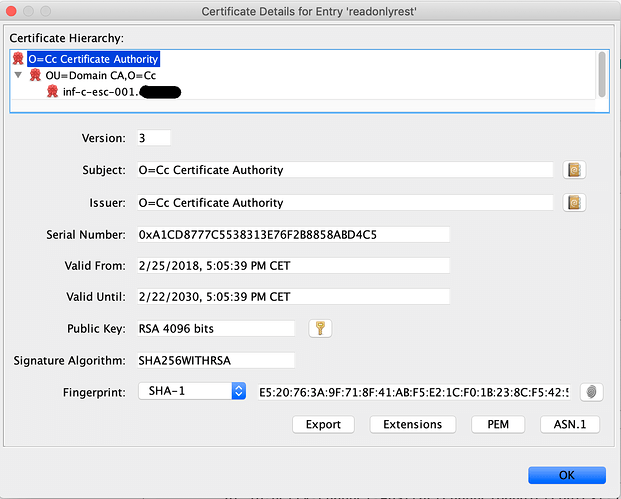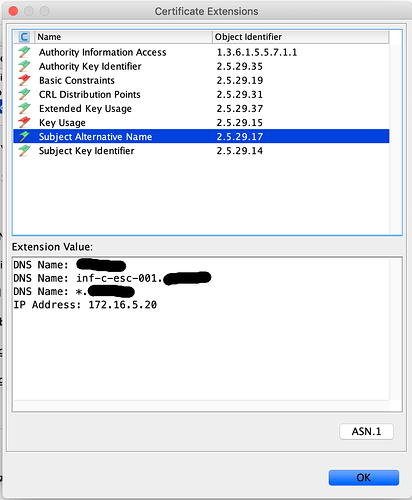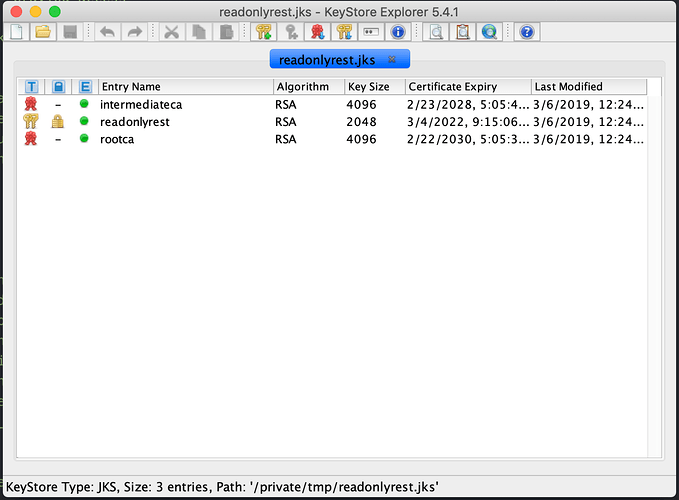Thanks a lot… I spent 2 hours doing different tests before I decided to ask for help LOL.
Now I have other issues that seems related to the SSL certificates. I have a lot of exceptions :
2019-03-06T12:25:10,765][WARN ][o.e.t.TcpTransport ] [inf-c-esc-001] exception caught on transport layer [Netty4TcpChannel{localAddress=0.0.0.0/0.0.0.0:9300, remoteAddress=/172.16.5.21:33420}], closing connection
io.netty.handler.codec.DecoderException: javax.net.ssl.SSLHandshakeException: null cert chain
at io.netty.handler.codec.ByteToMessageDecoder.callDecode(ByteToMessageDecoder.java:472) ~[netty-codec-4.1.32.Final.jar:4.1.32.Final]
at io.netty.handler.codec.ByteToMessageDecoder.channelRead(ByteToMessageDecoder.java:278) ~[netty-codec-4.1.32.Final.jar:4.1.32.Final]
at io.netty.channel.AbstractChannelHandlerContext.invokeChannelRead(AbstractChannelHandlerContext.java:362) [netty-transport-4.1.32.Final.jar:4.1.32.Final]
at io.netty.channel.AbstractChannelHandlerContext.invokeChannelRead(AbstractChannelHandlerContext.java:348) [netty-transport-4.1.32.Final.jar:4.1.32.Final]
at io.netty.channel.AbstractChannelHandlerContext.fireChannelRead(AbstractChannelHandlerContext.java:340) [netty-transport-4.1.32.Final.jar:4.1.32.Final]
at io.netty.channel.DefaultChannelPipeline$HeadContext.channelRead(DefaultChannelPipeline.java:1434) [netty-transport-4.1.32.Final.jar:4.1.32.Final]
at io.netty.channel.AbstractChannelHandlerContext.invokeChannelRead(AbstractChannelHandlerContext.java:362) [netty-transport-4.1.32.Final.jar:4.1.32.Final]
at io.netty.channel.AbstractChannelHandlerContext.invokeChannelRead(AbstractChannelHandlerContext.java:348) [netty-transport-4.1.32.Final.jar:4.1.32.Final]
at io.netty.channel.DefaultChannelPipeline.fireChannelRead(DefaultChannelPipeline.java:965) [netty-transport-4.1.32.Final.jar:4.1.32.Final]
at io.netty.channel.nio.AbstractNioByteChannel$NioByteUnsafe.read(AbstractNioByteChannel.java:163) [netty-transport-4.1.32.Final.jar:4.1.32.Final]
at io.netty.channel.nio.NioEventLoop.processSelectedKey(NioEventLoop.java:656) [netty-transport-4.1.32.Final.jar:4.1.32.Final]
at io.netty.channel.nio.NioEventLoop.processSelectedKeysPlain(NioEventLoop.java:556) [netty-transport-4.1.32.Final.jar:4.1.32.Final]
at io.netty.channel.nio.NioEventLoop.processSelectedKeys(NioEventLoop.java:510) [netty-transport-4.1.32.Final.jar:4.1.32.Final]
at io.netty.channel.nio.NioEventLoop.run(NioEventLoop.java:470) [netty-transport-4.1.32.Final.jar:4.1.32.Final]
at io.netty.util.concurrent.SingleThreadEventExecutor$5.run(SingleThreadEventExecutor.java:909) [netty-common-4.1.32.Final.jar:4.1.32.Final]
at java.lang.Thread.run(Thread.java:748) [?:1.8.0_151]
Caused by: javax.net.ssl.SSLHandshakeException: null cert chain
at sun.security.ssl.Handshaker.checkThrown(Handshaker.java:1478) ~[?:?]
at sun.security.ssl.SSLEngineImpl.checkTaskThrown(SSLEngineImpl.java:535) ~[?:?]
at sun.security.ssl.SSLEngineImpl.readNetRecord(SSLEngineImpl.java:813) ~[?:?]
at sun.security.ssl.SSLEngineImpl.unwrap(SSLEngineImpl.java:781) ~[?:?]
at javax.net.ssl.SSLEngine.unwrap(SSLEngine.java:624) ~[?:1.8.0_151]
at io.netty.handler.ssl.SslHandler$SslEngineType$3.unwrap(SslHandler.java:295) ~[netty-handler-4.1.32.Final.jar:4.1.32.Final]
at io.netty.handler.ssl.SslHandler.unwrap(SslHandler.java:1301) ~[netty-handler-4.1.32.Final.jar:4.1.32.Final]
at io.netty.handler.ssl.SslHandler.decodeJdkCompatible(SslHandler.java:1203) ~[netty-handler-4.1.32.Final.jar:4.1.32.Final]
at io.netty.handler.ssl.SslHandler.decode(SslHandler.java:1247) ~[netty-handler-4.1.32.Final.jar:4.1.32.Final]
at io.netty.handler.codec.ByteToMessageDecoder.decodeRemovalReentryProtection(ByteToMessageDecoder.java:502) ~[netty-codec-4.1.32.Final.jar:4.1.32.Final]
at io.netty.handler.codec.ByteToMessageDecoder.callDecode(ByteToMessageDecoder.java:441) ~[netty-codec-4.1.32.Final.jar:4.1.32.Final]
... 15 more
Caused by: javax.net.ssl.SSLHandshakeException: null cert chain
at sun.security.ssl.Alerts.getSSLException(Alerts.java:192) ~[?:?]
at sun.security.ssl.SSLEngineImpl.fatal(SSLEngineImpl.java:1666) ~[?:?]
at sun.security.ssl.Handshaker.fatalSE(Handshaker.java:304) ~[?:?]
at sun.security.ssl.Handshaker.fatalSE(Handshaker.java:292) ~[?:?]
at sun.security.ssl.ServerHandshaker.clientCertificate(ServerHandshaker.java:1862) ~[?:?]
at sun.security.ssl.ServerHandshaker.processMessage(ServerHandshaker.java:233) ~[?:?]
at sun.security.ssl.Handshaker.processLoop(Handshaker.java:1026) ~[?:?]
at sun.security.ssl.Handshaker$1.run(Handshaker.java:966) ~[?:?]
at sun.security.ssl.Handshaker$1.run(Handshaker.java:963) ~[?:?]
at java.security.AccessController.doPrivileged(Native Method) ~[?:1.8.0_151]
at sun.security.ssl.Handshaker$DelegatedTask.run(Handshaker.java:1416) ~[?:?]
at io.netty.handler.ssl.SslHandler.runDelegatedTasks(SslHandler.java:1464) ~[netty-handler-4.1.32.Final.jar:4.1.32.Final]
at io.netty.handler.ssl.SslHandler.unwrap(SslHandler.java:1369) ~[netty-handler-4.1.32.Final.jar:4.1.32.Final]
at io.netty.handler.ssl.SslHandler.decodeJdkCompatible(SslHandler.java:1203) ~[netty-handler-4.1.32.Final.jar:4.1.32.Final]
at io.netty.handler.ssl.SslHandler.decode(SslHandler.java:1247) ~[netty-handler-4.1.32.Final.jar:4.1.32.Final]
at io.netty.handler.codec.ByteToMessageDecoder.decodeRemovalReentryProtection(ByteToMessageDecoder.java:502) ~[netty-codec-4.1.32.Final.jar:4.1.32.Final]
at io.netty.handler.codec.ByteToMessageDecoder.callDecode(ByteToMessageDecoder.java:441) ~[netty-codec-4.1.32.Final.jar:4.1.32.Final]
... 15 more
and
2019-03-06T12:25:10,839][WARN ][o.e.t.TcpTransport ] [inf-c-esc-001] send message failed [channel: Netty4TcpChannel{localAddress=0.0.0.0/0.0.0.0:58622, remoteAddress=/172.16.5.21:9300}]
javax.net.ssl.SSLException: Received fatal alert: bad_certificate
at sun.security.ssl.Alerts.getSSLException(Alerts.java:208) ~[?:?]
at sun.security.ssl.SSLEngineImpl.fatal(SSLEngineImpl.java:1666) ~[?:?]
at sun.security.ssl.SSLEngineImpl.fatal(SSLEngineImpl.java:1634) ~[?:?]
at sun.security.ssl.SSLEngineImpl.recvAlert(SSLEngineImpl.java:1800) ~[?:?]
at sun.security.ssl.SSLEngineImpl.readRecord(SSLEngineImpl.java:1083) ~[?:?]
at sun.security.ssl.SSLEngineImpl.readNetRecord(SSLEngineImpl.java:907) ~[?:?]
at sun.security.ssl.SSLEngineImpl.unwrap(SSLEngineImpl.java:781) ~[?:?]
at javax.net.ssl.SSLEngine.unwrap(SSLEngine.java:624) ~[?:1.8.0_151]
at io.netty.handler.ssl.SslHandler$SslEngineType$3.unwrap(SslHandler.java:295) ~[netty-handler-4.1.32.Final.jar:4.1.32.Final]
at io.netty.handler.ssl.SslHandler.unwrap(SslHandler.java:1301) [netty-handler-4.1.32.Final.jar:4.1.32.Final]
at io.netty.handler.ssl.SslHandler.decodeJdkCompatible(SslHandler.java:1203) [netty-handler-4.1.32.Final.jar:4.1.32.Final]
at io.netty.handler.ssl.SslHandler.decode(SslHandler.java:1247) [netty-handler-4.1.32.Final.jar:4.1.32.Final]
at io.netty.handler.codec.ByteToMessageDecoder.decodeRemovalReentryProtection(ByteToMessageDecoder.java:502) [netty-codec-4.1.32.Final.jar:4.1.32.Final]
at io.netty.handler.codec.ByteToMessageDecoder.callDecode(ByteToMessageDecoder.java:441) [netty-codec-4.1.32.Final.jar:4.1.32.Final]
at io.netty.handler.codec.ByteToMessageDecoder.channelRead(ByteToMessageDecoder.java:278) [netty-codec-4.1.32.Final.jar:4.1.32.Final]
at io.netty.channel.AbstractChannelHandlerContext.invokeChannelRead(AbstractChannelHandlerContext.java:362) [netty-transport-4.1.32.Final.jar:4.1.32.Final]
at io.netty.channel.AbstractChannelHandlerContext.invokeChannelRead(AbstractChannelHandlerContext.java:348) [netty-transport-4.1.32.Final.jar:4.1.32.Final]
at io.netty.channel.AbstractChannelHandlerContext.fireChannelRead(AbstractChannelHandlerContext.java:340) [netty-transport-4.1.32.Final.jar:4.1.32.Final]
at io.netty.channel.DefaultChannelPipeline$HeadContext.channelRead(DefaultChannelPipeline.java:1434) [netty-transport-4.1.32.Final.jar:4.1.32.Final]
at io.netty.channel.AbstractChannelHandlerContext.invokeChannelRead(AbstractChannelHandlerContext.java:362) [netty-transport-4.1.32.Final.jar:4.1.32.Final]
at io.netty.channel.AbstractChannelHandlerContext.invokeChannelRead(AbstractChannelHandlerContext.java:348) [netty-transport-4.1.32.Final.jar:4.1.32.Final]
at io.netty.channel.DefaultChannelPipeline.fireChannelRead(DefaultChannelPipeline.java:965) [netty-transport-4.1.32.Final.jar:4.1.32.Final]
at io.netty.channel.nio.AbstractNioByteChannel$NioByteUnsafe.read(AbstractNioByteChannel.java:163) [netty-transport-4.1.32.Final.jar:4.1.32.Final]
at io.netty.channel.nio.NioEventLoop.processSelectedKey(NioEventLoop.java:656) [netty-transport-4.1.32.Final.jar:4.1.32.Final]
at io.netty.channel.nio.NioEventLoop.processSelectedKeysPlain(NioEventLoop.java:556) [netty-transport-4.1.32.Final.jar:4.1.32.Final]
at io.netty.channel.nio.NioEventLoop.processSelectedKeys(NioEventLoop.java:510) [netty-transport-4.1.32.Final.jar:4.1.32.Final]
at io.netty.channel.nio.NioEventLoop.run(NioEventLoop.java:470) [netty-transport-4.1.32.Final.jar:4.1.32.Final]
at io.netty.util.concurrent.SingleThreadEventExecutor$5.run(SingleThreadEventExecutor.java:909) [netty-common-4.1.32.Final.jar:4.1.32.Final]
at java.lang.Thread.run(Thread.java:748) [?:1.8.0_151]
We use our own PKI and it seems to me that I included correcly the certificate chain in the keystore.
Any idea ?
I do not know what to do more to solve this problem.
Thank you.
As additional info please note that the IP of the server is also added to the “subject alternative name”.
Are you currently using the same certificate with Searchguard or is the first time that you are trying to apply transport port security?
No we never tried Searchguard as the LDAP support is not a part of the free open source version. And I didn’t want to mix Searchguard SSL and ReadonlyRest.
Regarding the SSL certificates, we manage our PKI using ansible and we already used successfuly our generated certificates with other tools like MongoDB replica set or Consul clusters.
Thank you.
How do you normally configure your certs in Mongo or Consul?
Hi,
If I take the example of MongoDB, here is the related config :
net:
bindIp: 0.0.0.0
ipv6: false
maxIncomingConnections: 65536
port: 27017
ssl:
mode: preferSSL
PEMKeyFile: /etc/pki/realms/domain/default.pem
The mode preferSSL means that connections between servers use TLS/SSL and for incoming clients connections, the server accepts both TLS/SSL and non-TLS/non-SSL.
The default.pem file contains the private key, the server certificate and the intermediate certificate. As the CAFile directive is not specified, MongoDB will use the system-wide CA certificate store.
Our internal CA certificate is added automatically to the system-wide CA certificate store by ansible when provisioning our servers.
Regarding the details of each file :
- default.pem contains the private key, the server certificate and the intermediate certificate.
- CA.pem contains the intermediate certificate and the root certificate.
I tried to add all of them (grouped or individually) in the keystore without success.
Thanks a lot for your help.


